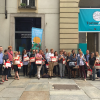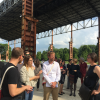The first study visit of project MOLOC, “Low carbon urban morphologies. New urban morphologies, new management systems, new challenges for cities in the face of the transition to a low carbon economy,” financed using funds from the Interreg Europe programme, took place in Turin, Italy.
The schedule of the two-day meeting encompassed a presentation of the area development plan of the city of Turin as a tool for the purposes of efficient energy use and low carbon policy, the experience of Turin concerning the revitalisation of post-industrial areas, as well as the activities of the Polytechnic University of Turin and the Energy Center Lab. An area development decision making system regarding energy planning in the city was presented during the meeting. The MOLOC study visit in Turin was included in the official programme of the EU Green Week conference https://www.eugreenweek.eu/daily-report/daily-report-day-three. Additionally, study visits of post-industrial sites (steel- and ironworks, Fiat production floors, textile mills, etc.) that have undergone transformation into recreational, educational and cultural areas, such as parks, football pitches, schools, restaurants and museums, were prepared for the meeting as well.
The city of Lille is the leader of the project, while its partner cities include: Turin (Italy), Hamburg (Germany) and Suceava (Romania), as well as the Central Mining Institute in cooperation with the city of Katowice (Poland) and the European Association “Energy Cities”. During the meeting, the Polish part of the project was represented by Beata Urych, D.Sc., and Anna Śliwińska, D.Sc., of the Central Mining Institute, and Mr Daniel Wolny of the Katowice City Council.





